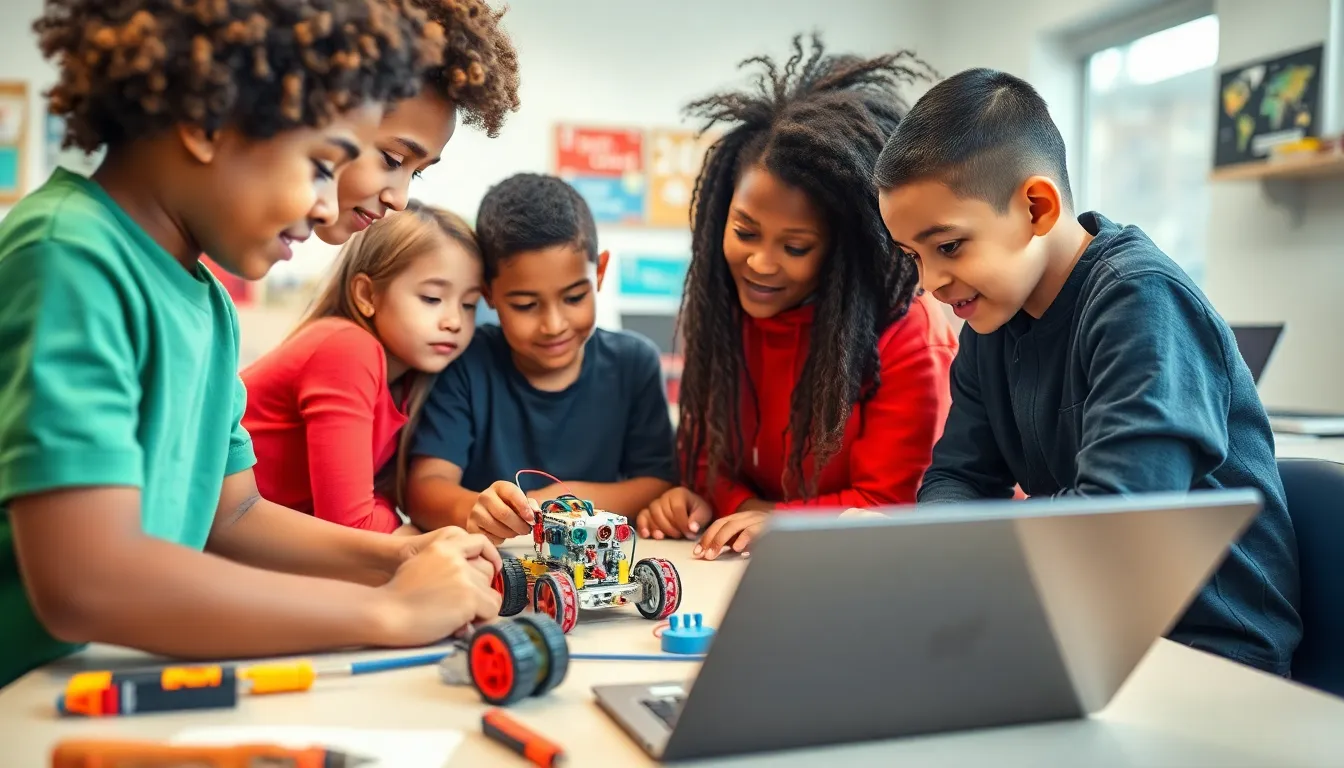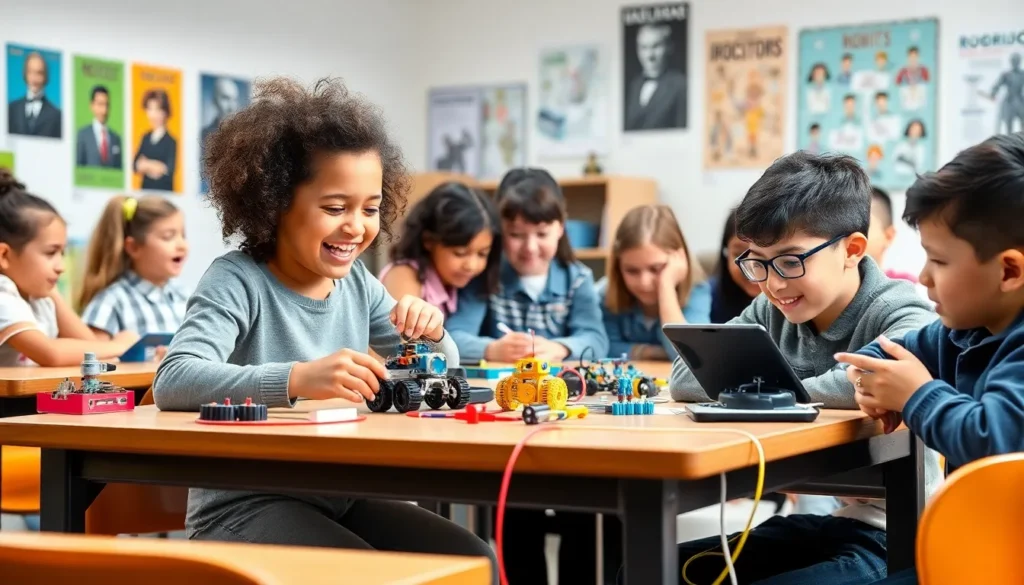In a world where robots might soon take over the chores (and maybe even the cooking), it’s time to get kids in on the action. Robotics classes for kids not only spark creativity but also turn young minds into future innovators. Imagine your child building a robot that can fetch snacks—now that’s a skill worth having!
These classes are popping up everywhere, making it easier than ever to find one nearby. With hands-on projects and a dash of fun, kids learn the basics of coding, engineering, and teamwork. Plus, who wouldn’t want to brag about their child’s latest robotic creation? So why not let them dive into the world of robotics and watch as they transform from curious learners to mini tech geniuses?
Table of Contents
ToggleBenefits Of Robotics Classes For Kids
Robotics classes offer numerous benefits that can significantly impact children’s development. The classes nurture essential skills in young learners, preparing them for future challenges in a tech-driven world.
Enhancing Problem-Solving Skills
Robotics classes cultivate critical thinking abilities in children. Students engage in hands-on projects that present real-world problems, requiring them to devise practical solutions. Through building robots, kids learn to analyze challenges, test their ideas, and iterate on designs. Collaboration with peers further reinforces these skills, as teamwork necessitates sharing insights and strategies. Ultimately, these experiences provide a foundational understanding of how to approach complex scenarios with confidence.
Fostering Creativity And Innovation
Robotics programs encourage imaginative thinking among kids. Classes integrate design processes that let students experiment with various components to create unique robots. Such explorations inspire original ideas while allowing children to express themselves in innovative ways. As they navigate the design challenges, students also learn to embrace failure as part of the creative process. This mindset cultivates resilience, ensuring they think outside the box in future endeavors. Engaging in robotics solidifies a creative foundation essential for countless fields.
Types Of Robotics Classes Available

Robotics classes for kids include various options tailored for different skill levels and interests. Parents can explore beginner and advanced classes to find the best fit for their children.
Beginner Classes
Beginner classes introduce foundational concepts in robotics. Students learn basic coding skills alongside hands-on activities. Classes often include projects like building simple robots that perform basic tasks. Instructors guide kids through the use of educational robotics kits. Exposure to these basics fosters confidence and sparks interest in technology. Teams often work together, promoting collaboration and communication among peers. Engaging activities allow kids to enjoy learning while developing critical skills essential for future success.
Advanced Classes
Advanced classes build upon prior knowledge with more complex challenges. These sessions cater to children with a deeper understanding of robotics and programming. Exploration of advanced coding languages and specialized robotics kits occurs here. Participants design, program, and test robotics projects that solve real-world problems. Critical thinking and problem-solving skills are emphasized throughout these classes. Teams collaborate on intricate projects, simulating real-life engineering scenarios. Exposure to robotics competitions may also serve as motivation for budding engineers.
How To Find Robotics Classes For Kids Near Me
Finding robotics classes for kids involves leveraging various resources. Many online platforms provide extensive listings of classes tailored to various age groups and skill levels. Websites like Kids Robotics and STEM Ecosystems offer search functionalities that allow parents to filter options based on location, duration, and curriculum focus. Parents can explore video tutorials and virtual workshops that may supplement in-person learning, enhancing their child’s skills at home.
Local community centers often host robotics programs. These classes not only present opportunities for hands-on learning but also encourage social interaction with peers. Many centers collaborate with local schools and tech organizations, ensuring up-to-date resources and knowledgeable instructors. Parents can inquire about seasonally offered camps or after-school programs that focus on robotics, coding, and engineering projects. Checking bulletin boards or community event listings can reveal upcoming sessions.
Factors To Consider When Choosing A Class
Choosing the right robotics class for kids involves several important factors. Parents should evaluate each aspect carefully to ensure the best fit for their child’s interests and learning style.
Instructor Qualifications
Instructor qualifications play a significant role in a child’s learning experience. Look for instructors with a strong background in robotics, engineering, or education. Experienced educators often possess degrees in STEM fields and have hands-on experience in robotics. Additionally, finding instructors who encourage creativity and foster a supportive environment can enhance student engagement. Teachers with prior experience in classroom settings focus on both skill development and nurturing critical thinking abilities.
Class Size And Structure
Class size and structure impact peer interaction and individualized attention. Small class sizes generally allow for more hands-on support, ensuring that each child receives adequate guidance. When classes are structured around group projects, collaboration becomes essential. Active participation in team-oriented tasks promotes communication skills and teamwork. Opting for classes that balance theory with practical activities provides a well-rounded educational experience. Classes structured to adapt to various skill levels also cater to different learning speeds, ensuring that every child can progress comfortably.
Robotics classes for kids offer an exciting pathway to develop essential skills in a fun and engaging environment. By participating in these programs, children not only learn about technology but also enhance their creativity and problem-solving abilities. The collaborative nature of these classes prepares them for real-world challenges while fostering a passion for innovation.
Parents looking for local options can find a variety of programs tailored to different interests and skill levels. With the right class, children can embark on a journey that nurtures their curiosity and sets the foundation for future success in an increasingly tech-driven world. Investing in robotics education today means equipping kids with the tools they need for tomorrow’s challenges.










